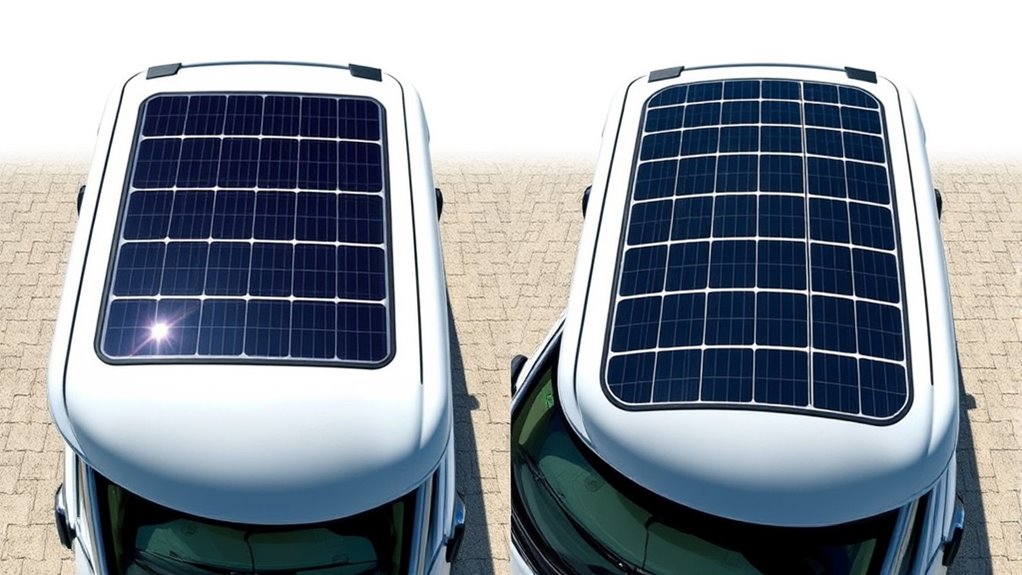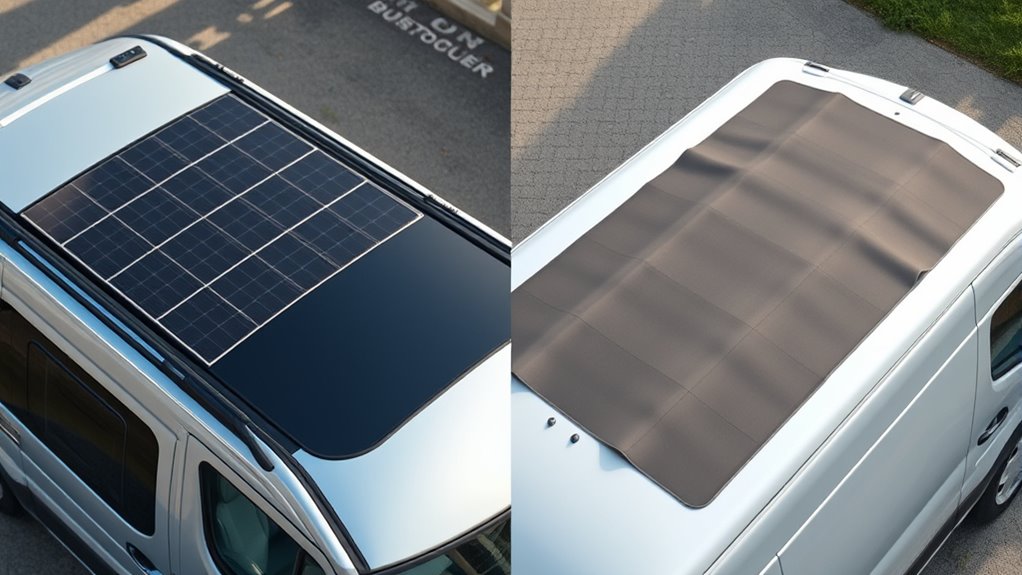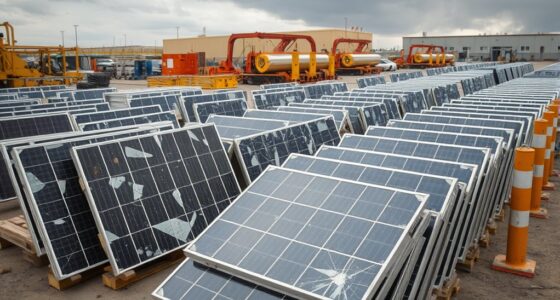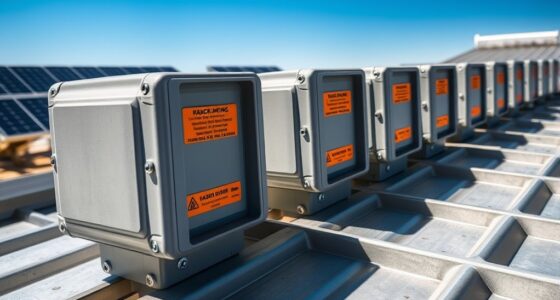Choosing between rigid and flexible solar panels for your van roof depends on your needs. Rigid panels are durable, impact-resistant, and easier to install on flat surfaces, but they can be bulky and less sleek. Flexible panels contour better to curved roofs and are lightweight, making installation easier, but they may be less durable over time. To find out which option best fits your van, consider your priorities and the specifics of your setup.
Key Takeaways
- Rigid panels provide durability and are ideal for flat van roofs, while flexible panels are better for curved surfaces.
- Flexible panels are lightweight and easier to install without drilling, suitable for non-flat van roofs.
- Rigid panels are more impact-resistant and weather-proof, offering longer lifespan in rugged environments.
- Flexible panels offer a sleek, seamless look that integrates better with aesthetic van designs.
- The choice depends on van roof shape, installation ease, durability needs, and aesthetic preferences.

When choosing solar panels, understanding the differences between rigid and flexible options is essential, especially for van roofs. Your decision impacts not just how much energy you generate but also how easily you can install and integrate the panels into your vehicle’s design. Rigid panels are the traditional choice, made of tempered glass and aluminum frames, providing durability and a straightforward mounting process. However, mounting challenges can arise since these panels require solid, flat surfaces for secure attachment. You’ll need to ensure your van roof can support their weight and that you have enough space for proper placement. On the other hand, flexible panels are lightweight and thin, allowing for easier installation on curved or uneven surfaces. They conform to the shape of your roof, reducing mounting challenges and making it possible to install them without drilling or heavy hardware. This flexibility minimizes the risk of leaks or roof damage, which is a common concern with rigid panels. Additionally, flexible panels often have a lower profile, enhancing the overall aesthetic by maintaining a sleek appearance.
Aesthetic considerations also play a significant role in your choice. Rigid panels tend to have a classic, boxy look that some might find less appealing, especially if you’re aiming for a sleek, minimalist design. Their larger, more prominent profile can detract from your van’s overall aesthetic. Flexible panels, however, sit flush against the roof, offering a sleeker, more integrated appearance. They tend to be less obtrusive and can blend seamlessly with your van’s surface, which many find more visually appealing. If maintaining a clean, unobtrusive look is important to you, flexible panels are often the better choice.
Another factor to consider is durability. Rigid panels usually last longer and handle harsh weather better, thanks to their sturdy glass and frame construction. They’re more resistant to impacts and debris, which can be a concern when you’re traveling through rugged environments. Flexible panels, while more convenient for installation, may be more susceptible to damage from hail, debris, or sharp objects. They might also degrade faster over time, especially if exposed to prolonged sunlight and weather elements. The material composition of rigid versus flexible panels significantly influences their lifespan and performance in diverse conditions.
Frequently Asked Questions
How Do Panel Weights Affect Van Roof Load Capacity?
Panel weight directly impacts your van’s load capacity, so it’s crucial to take into account. Heavier panels add more weight to your roof, which could limit what else you can carry or strain your vehicle. Lighter panels help preserve your van’s load capacity, making it easier to add other gear or supplies. Always check the panel’s weight and compare it to your van’s maximum roof load to guarantee safety and peak performance.
Can Flexible Panels Be Painted or Customized Easily?
Flexible solar panels often have limited customization options and can be more challenging to paint or customize for solar panel aesthetics. You might find it difficult to alter their appearance without damaging the panel or voiding warranties. If aesthetics are important to you, rigid panels may offer better customization options, since they can be painted or customized more easily, allowing you to personalize your van’s look while maintaining functionality.
What Maintenance Differences Exist Between Rigid and Flexible Panels?
You’ll find that rigid panels generally require less maintenance due to their durable solar panel durability, which resists weather and debris better. They also tend to be easier to clean and inspect, thanks to their sturdy, flat surfaces. Flexible panels, while lighter and easier to install, may need more frequent checks for cracks or damage. Overall, rigid panels offer a more straightforward maintenance routine, making them a reliable choice for long-term use.
Are Flexible Panels More Aerodynamic Than Rigid Panels?
Flexible panels generally offer better aerodynamic efficiency because they conform closely to your van’s roof, reducing airflow disruptions. This means improved airflow dynamics, especially at higher speeds, minimizing drag. Rigid panels tend to be bulkier and create more turbulence, which can reduce efficiency. So, if you’re looking for smoother airflow and less resistance, flexible panels are your best choice for enhancing your van’s aerodynamic profile.
How Do Panels Perform in Extreme Weather Conditions?
In extreme weather, your panels’ solar efficiency and panel durability become vital. Rigid panels typically withstand high winds and snow better, maintaining efficiency longer. Flexible panels, while lightweight and easier to install, may suffer damage or reduced efficiency in hail or heavy storms. You should choose based on your climate; rigid panels suit harsh conditions, ensuring your system stays reliable and efficient over time.
Conclusion
Ultimately, choosing between rigid and flexible panels depends on your van life needs. Think of it like selecting a trusty steed—each has its strengths, but only you can decide which fits your journey best. Don’t be a digital damsel waiting for the perfect moment; take action now. Just remember, as they say in old tales, “A rolling stone gathers no moss.” So, pick your panels and hit the road—adventure awaits!









